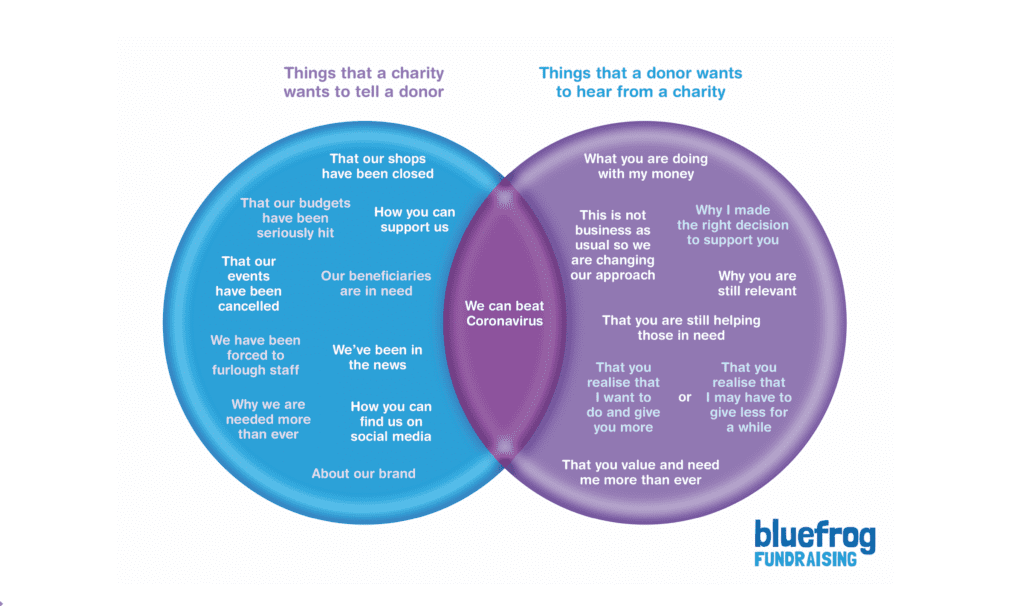Coronavirus research finding. What do donors think about giving now?
Our thanks go to Mark Phillips of Bluefrog Fundraising for letting us share the latest findings from their coronavirus research.
- Written by
- Mark Phillips
- Added
- July 16, 2020

Following on from round one of our research study into donor attitudes to giving in the time of coronavirus, we are now able to release our second set of findings.
The methodology remains the same as that used during the first stage, comprising depth interviews with people who actually give to charity. But this time, we ensured that our sample included donors who had cut back on their giving. We also asked specific questions about attitudes to giving to overseas development charities during the pandemic. interviews for this stage concluded at the very start of May.
We are sharing the findings as a webcast. It’s free to watch and you can dip in and out as and when you like. Please also feel free to share. There’s a great deal to cover, so it lasts an hour. We focus on what donors have told us and show how their approach to giving has changed. Following your requests, we give examples of how we have used findings to create more effective appeals. Finally, as the lockdown (in the UK) begins to be relaxed, we make recommendations for what fundraisers should be doing now.
You can download the CAF research, Britain’s Civic Core, here.
Key findings are:
- Younger donors are getting fed up with coronavirus and want to get on with their lives now. Older donors want to get through the pandemic as painlessly as possible.
- Giving is increasingly seen as good – as is fundraising. Even donors who have been hit economically are remaining remarkably generous.
- Donors still see very few requests from charities. Citizen fundraisers like Colonel Tom Moore, have filled the vacuum.
- Direct debits (monthly gifts) remain under threat as the automated nature of payments are a concern for donors who feel financially insecure.
- Payment holidays are welcomed by those people considering cancellations, but they need to be longer than just a few months.
- People are now feeling more in control of the lives as they have created new ways to live, work and support charities in response to the pandemic.
- This has threatened loyalty to charities that are seen as irrelevant or not in need of funds (as they haven’t asked for help).
- However, charities that have little relevance to tackling coronavirus will still receive support from donors that value them.
- International development charities are increasingly seen as both important and relevant. However, there is a problem engaging some donors who feel that Coronavirus in very poor countries will be overwhelming.
- The news cycle remains a driver and predictor of relevance. We identify two groups of NHS donors and show what they want their donations to achieve.
- With people and companies under financial threat, charities are not seen to be a special case. Only some causes can comfortably focus on the threat of closure as an appeal subject. Other charities should avoid it.
- We show how Considered Uncertainty (identified by Bluefrog’s Steve Lynch) is an important approach to incorporate into appeals.
- We identify the key need states that donors exhibit that charities must answer if they are to regain their place as the key vehicle for driving change in society.
- We expect the upswing in philanthropy to continue.
- People still tend to use the term coronavirus rather than Covid-19.
We have created a coronavirus-specific version of The Fundraiser’s Paradox to help with planning communications. The three important takeaways are:
Focus on what donors want to hear – show what you are doing to help beneficiaries. This isn’t a time to just show need. Show relevance too.
Show how you are innovating – demonstrate how you have adapted your approach to the current situation and are delivering services from a physical distance – and how you are protecting front-line staff and beneficiaries.
Show your donors they are valued – it is important that donors know that you value their support and that it is getting through to those people (or animals) that need it. Ask. Thank. And Report. And make it specific to the value of the gifts donors are giving.
Next steps
The research will continue and we expect to publish the next round of findings in June. This report obviously just represents highlights. There are important nuances for different charities – particularly those working in the spheres of healthcare and animal protection along with organisations working in education, arts and culture.


















